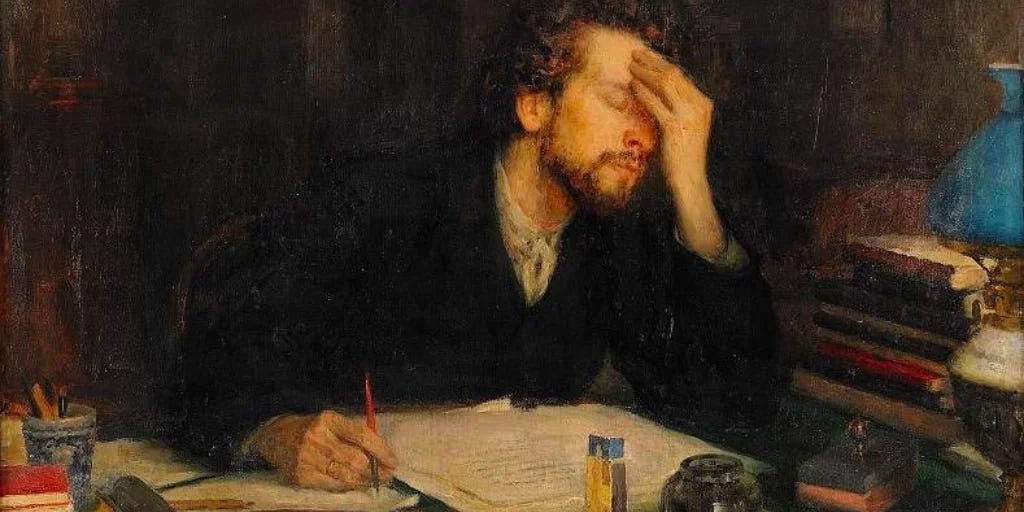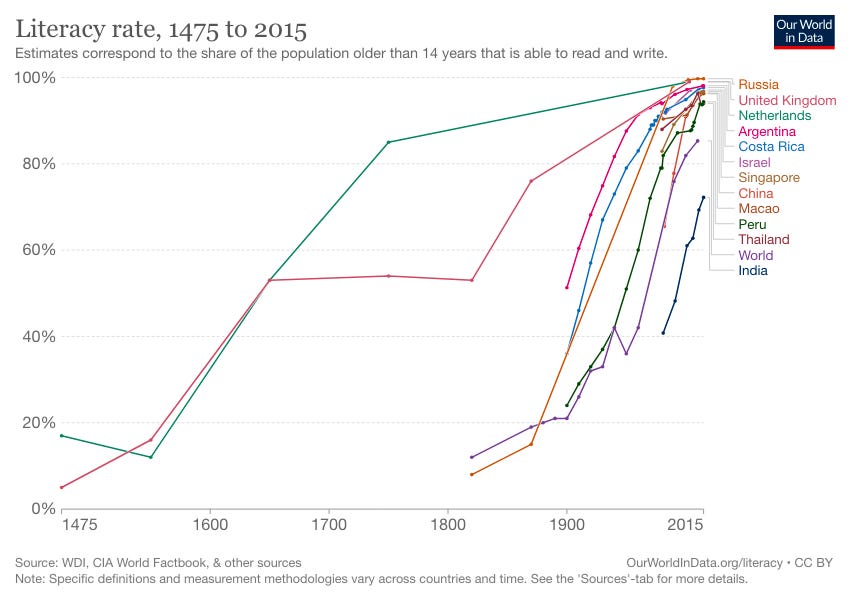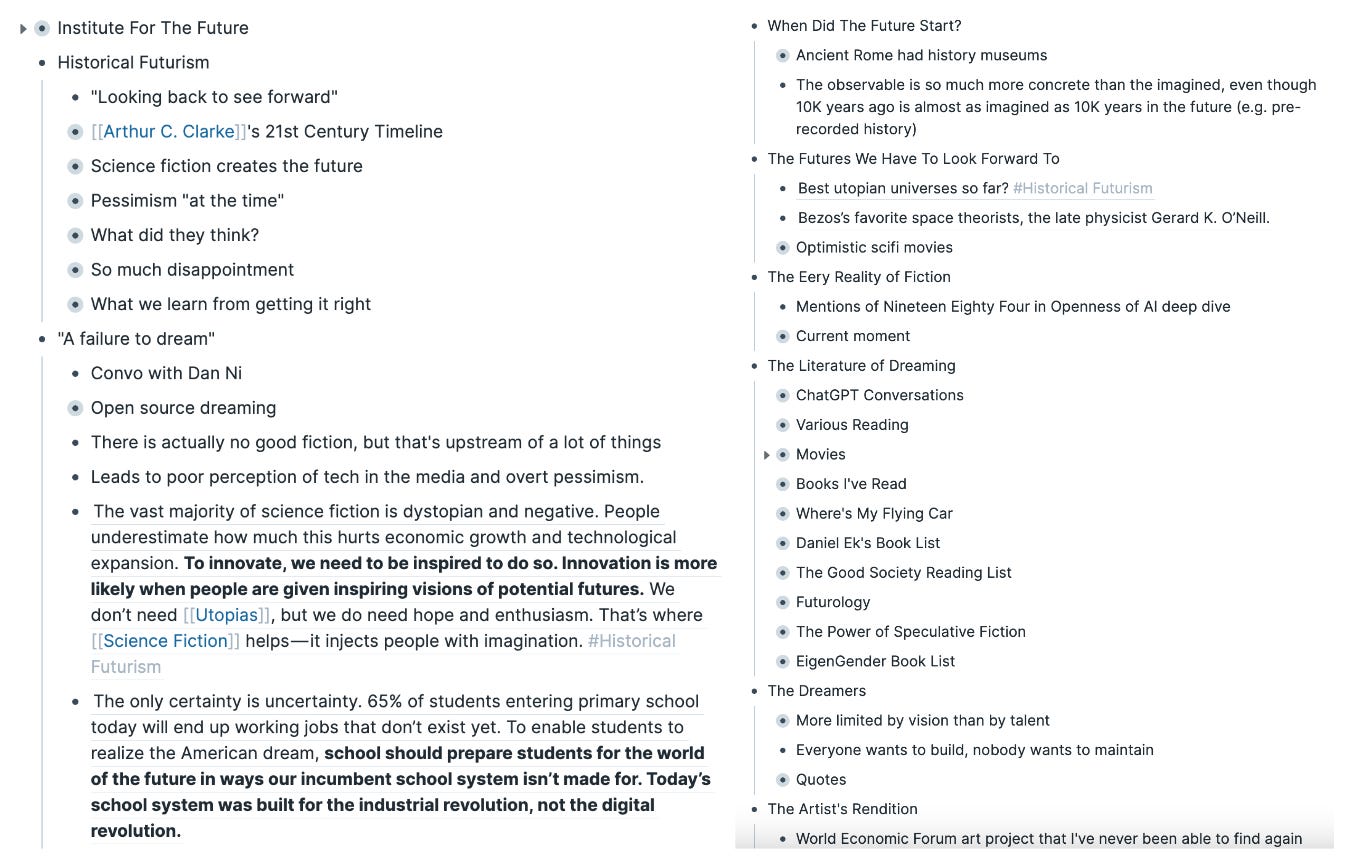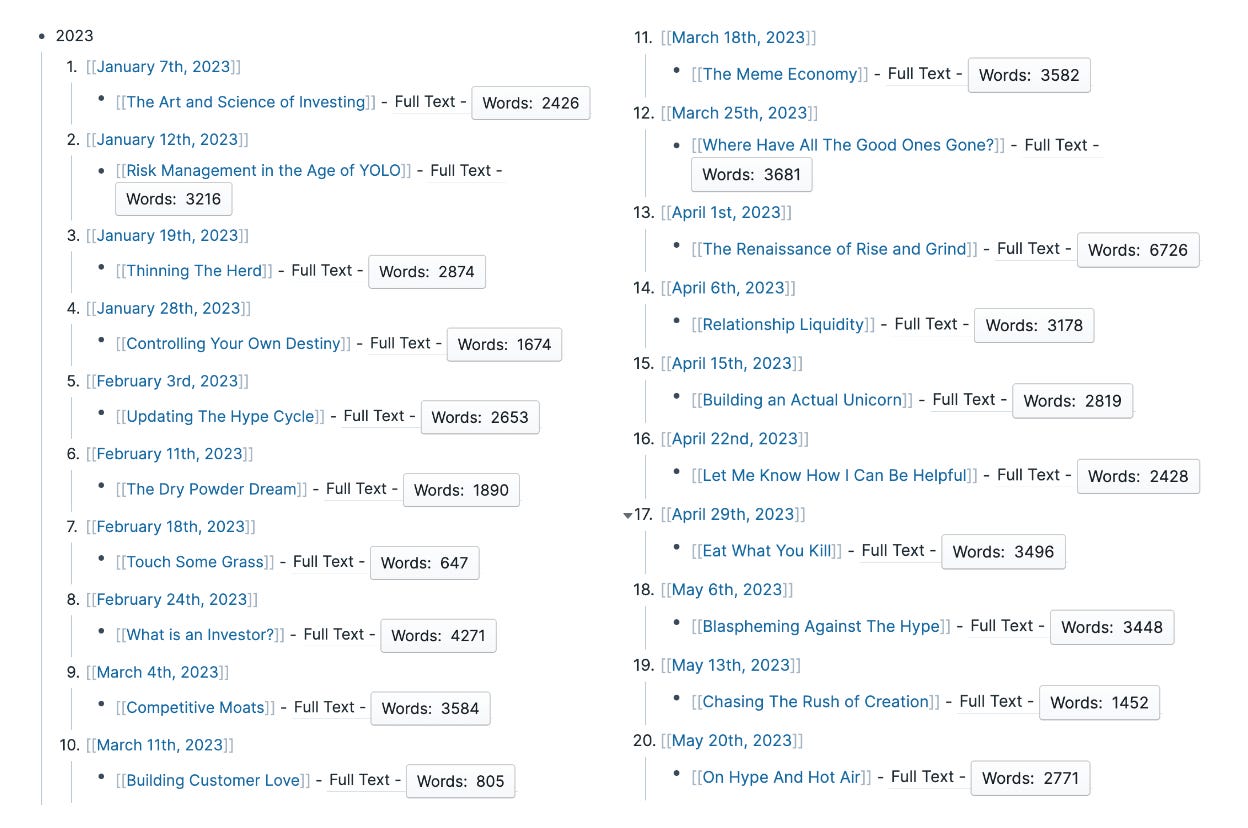The Wrath of Reading & Writing
"Where is the wisdom we have lost in knowledge? Where is the knowledge we have lost in information?" (T.S. Eliot)
This is a weekly newsletter about the art and science of building and investing in tech companies. To receive Investing 101 in your inbox each week, subscribe here:

This is not what I wanted to be writing today. Have you heard the phrase, "my eyes were too big for my stomach?" I've felt that a lot lately, only rather than loading up on a hefty plate of food my body could never consume, I instead tackle these concepts that are meaty beyond my capacity to tackle them, whether in time, talent, or energy.
I have these grand ambitions to tackle large and complex topics. This weeks immovable object? Historical Futurism. Now, the good news is I've got quite the outline laid out. But I just couldn't get there this week.
And for most people, thats perfectly acceptable. "Next time," they'd say. But lately, it has awoken in me a sense of existential dread. I see these concepts connecting in front of my eyes, but like an ethereal dream they exist just outside my reach. And that sent me down a rabbit hole of the meta elements of what I was trying to do. Why do I write? Why do I read? Why don't I read and write as much as I wish I did?
What's In A Knowledge Worker?
People throw around the phrase "knowledge workers" all the time; what they mean are clickity-clackers. People who work on computers. What does it actually mean to "work" in knowledge? Humans have always worked in knowledge. They’ve always been information input and behavior output machines. "Fire hot? No touch."
The act of "working" in knowledge is a fundamental aspect of being human. What has changed, instead, is the volume and mediums of information. The industrial revolution (among other things) helped drive an explosion in literacy rates around the world.

For a modern clickity-clacker, you're likely introduced to a range and breadth of concepts each day that the average person 500 years ago might not have seen in their entire lifetime. Some might argue that we don't have the mental capacity to effectively process all the information that gets thrown our way.
I, myself, am a big believer in the knowledge tools that have arisen to help us manage the inflow of information. For starters, the majority of my brain lives in Roam Research. I've written before about how I use it, but suffice it to say if it weren't for Roam, I would NOT be on my 81st consecutive week of writing something.
But despite the tools and the obsession with productivity, I find myself constantly falling short of my imagined capacity. I don't write as much as I'd like. I don't read as much as I like.
My Reading
Back in March 2023 I tried something new where I would attempt to document "what I was reading." I did it maybe three or four times before giving up. Why? Because the majority of my reading falls into three buckets:
(1) What I read for my investing work, which is usually deal-related and so I avoid talking about
(2) What I read as part of managing Contrary Research, which you can always read here
(3) What I read so that I can include it in whatever I'm writing about that week
So I read plenty each week. But I feel a hunger for ideas and concepts that I glance, but never conceive. I want to read more, not so I can tally more books on my "Books I Read" list at the end of the year. I want to read more because I can feel categories of limitations in my own understanding.
I keep coming up with these grand schemes of the schedules I'll set, or the apps I'll use to help me read more. But nothing sticks. So I'm brought back to that fundamental question, "why do I read?"
One of my favorite pieces on reading is actually largely about why reading isn't "all that matters." Frederik Gieschen wrote a piece called "The Reading Obsession." In it, he talks about how much investors LOVE to talk about how Warren Buffett just reads all day. The point he makes, instead, is that networking, building friendships, and traveling all played as important a role in Buffett's success as his reading.
But that concept brings me back to why I read, and it has to do with the foundational relationship reading has with every aspect of a successful life. Reading enables you to build a "prepared mind." This is a concept that came to my attention reading about Accel in the early days. In particular, they were inspired by a Louis Pasteur quote:
“In the fields of observation chance favors only the prepared mind.”
Peter Fenton, at Benchmark, has also talked a fair bit about having a prepared mind:
"The prepared mind, in a sense, is reacting to a different aspect of where opportunities come from. Preconditions. If you look at the great things that have happened in venture, there's a set of preconditions, a little bit like adaptation. Like people don't just start with a wing. It wasn't like all the sudden, insects could fly. There were preconditions, there little stubs that came off of amphibians, or fish, of course, we all came from fish, but if they didn't have a little stub, it wouldn't then compound towards the wings, so there's these preconditions. And so having a mobile phone penetration at 20% with GPS as a precondition for Uber, for Instagram."
In order for Buffett to be successful in networking, and traveling, and building relationships, he had to have “preconditions.” Reading gave him a prepared mind that he could take into those interactions. Reading is the process by which we build a prepared mind. If you haven't done the work to understand the concepts, you're much less prepared in every conversation you go into.
My Writing
When I started writing consistently at the beginning of 2022, I didn't want to overwhelm myself with goals and outcomes, so I only set one goal: don't miss a week. And I haven't. After writing 52 times last year, and this week being my 29th time, I've kept that goal. Consistency was all I wanted to focus on in the pursuit of building a habit, and I'm doing pretty well at that.
So given that I write more consistently than probably 90% of people, why am I so disappointed with my writing?
This week, as part of the Contrary Research Fellowship, we had Packy McCormick as our guest speaker. He talked about a similar evolution in his writing, where for a long time he felt the pressure to write each week. Eventually, he came to the conclusion that writing something good was more important than writing something each week. I love that.
Though, personally, I'm not ready to give up on my consistency goal. Like an recovering alcoholic 18 months in who still avoids bars, and gets the shakes, I'm just hanging on each week to one more week. Instead, my question of disappointment again brings me back to this fundamental question, "why do I write?"
On my personal website, I have a number of quotes that have struck me as most important to forming my way of thinking about the world and my place in it. But the one that I've kept close in mind since I really started writing towards the end of high school:
"I write because I don't know what I think until I read what I say." (Flannery O'Connor)
I've always liked that quote, though when I looked up the full quote it's a bit different: "Like the old lady, I don’t know so well what I think until I see what I say; then I have to say it over again." And funny enough, I like that even more. I feel the same way about writing as I feel about talking.
My wife will be the first to tell you that I'm a real ranter. I could talk for a long, long time. But one of my favorite experiences while talking, is talking about something that I've likely thought about a fair bit (see above: reading = prepared mind), but probably haven't ever really articulated. But then being forced to talk about it with someone, or to write out my perspective knowing that someone will read it... it's like I'm bringing that idea to life.
And that's what I want more of. I want the opportunity to bring more of these ideas to life.
Therefore, What?
I haven't a clue. This is one of the more frustrating experiences I have when I sometimes write something out. I don't have a conclusion.
I want to read more. Therefore? I don't know. I'll keep trying to read more.
I want to write more. Therefore? I don't know. I'll keep trying to write more.
Sometimes the first step in solving a problem is acknowledging you have a problem.
Thanks for reading! Subscribe here to receive Investing 101 in your inbox each week:






This really resonated with me. My Dad has the same problem. He told me when he was younger he walked into his university library, looked at the thousands of books and felt completely despondent that he would never get to read even a fraction of all them.
I like your reference to addiction as well. It feels like that sometimes - you're constantly chasing the 'high' of understanding something/expressing something through writing and getting that warm fuzzy feeling when you get it 'right'.
I don't have a conclusion either, other than accepting that lack of closure/conclusion as the solution in of itself(?)
I really feel the same! I think that's one of the reasons why I'm curating the information that I resonate with all the time! Read, curate, and write! That's what I do at Glasp :)
Check out the quotes I resonate with: https://glasp.co/#/kazuki
I'm collecting my favorite words because I don't know who I am until I connect the dots later :)